Refine search
No keyword found to refine search
keywords EN
Places
Names
39 documents found
| 1 |
Documents per page :
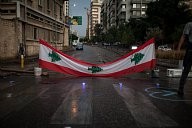
Demonstration in Beirut
Bilal Tarabey / Le Pictorium
LePictorium_0217359.jpg
A national flag blocks the entrance (cars) of the Christian district of Achrafieh, towards the city center.It has been a week now since the Lebanese are demonstrating. From their basic and spontaneous demands (the abolition of the famous Whatsapp and Viber messaging networks user fee project), the movement has since turned into a revolution. Lebanese of all religions and all faiths are gathered in the heart of the capital, recreate the social link between them. Since the end of the civil war, communities have been de facto separated, politically (each has its political party or parties) and geographically. Beirut is divided into homogeneous community neighborhoods, but these barriers have jumped. Everyone is now every night in the city center. And talk to each other This Thursday night the rain reduced the number of participants, but the city remained occupied by the demonstrators, who demand the abolition of the confessional system in place. Some marginal tensions took place, groups said to be related to the Hezbollah who appeared, without flags, but modifying some slogans to spare their leader the popular (verbal) vindictiveness. The speech of the President of the Republic Michel Aoun earlier in the afternoon, mounted, did not calm the protesters. In essence, it refuses any political and institutional change caused by the street. Many rely on this weekend to gather hundreds of thousands of people again. In parallel, a festival atmosphere is created, with its sellers of juice, tea, and even improvised hookah bars.
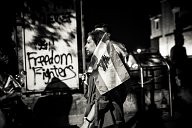
Demonstration in Beirut
Bilal Tarabey / Le Pictorium
LePictorium_0217360.jpg
It has been a week now since the Lebanese are demonstrating. From their basic and spontaneous demands (the abolition of the famous Whatsapp and Viber messaging networks user fee project), the movement has since turned into a revolution. Lebanese of all religions and all faiths are gathered in the heart of the capital, recreate the social link between them. Since the end of the civil war, communities have been de facto separated, politically (each has its political party or parties) and geographically. Beirut is divided into homogeneous community neighborhoods, but these barriers have jumped. Everyone is now every night in the city center. And talk to each other This Thursday night the rain reduced the number of participants, but the city remained occupied by the demonstrators, who demand the abolition of the confessional system in place. Some marginal tensions took place, groups said to be related to the Hezbollah who appeared, without flags, but modifying some slogans to spare their leader the popular (verbal) vindictiveness. The speech of the President of the Republic Michel Aoun earlier in the afternoon, mounted, did not calm the protesters. In essence, it refuses any political and institutional change caused by the street. Many rely on this weekend to gather hundreds of thousands of people again. In parallel, a festival atmosphere is created, with its sellers of juice, tea, and even improvised hookah bars.
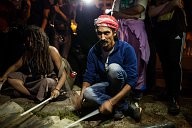
Demonstration in Beirut
Bilal Tarabey / Le Pictorium
LePictorium_0217361.jpg
Musicians doing a performance next to the seat of government. It has been a week now since the Lebanese are demonstrating. From their basic and spontaneous demands (the abolition of the famous Whatsapp and Viber messaging networks user fee project), the movement has since turned into a revolution. Lebanese of all religions and all faiths are gathered in the heart of the capital, recreate the social link between them. Since the end of the civil war, communities have been de facto separated, politically (each has its political party or parties) and geographically. Beirut is divided into homogeneous community neighborhoods, but these barriers have jumped. Everyone is now every night in the city center. And talk to each other This Thursday night the rain reduced the number of participants, but the city remained occupied by the demonstrators, who demand the abolition of the confessional system in place. Some marginal tensions took place, groups said to be related to the Hezbollah who appeared, without flags, but modifying some slogans to spare their leader the popular (verbal) vindictiveness. The speech of the President of the Republic Michel Aoun earlier in the afternoon, mounted, did not calm the protesters. In essence, it refuses any political and institutional change caused by the street. Many rely on this weekend to gather hundreds of thousands of people again. In parallel, a festival atmosphere is created, with its sellers of juice, tea, and even improvised hookah bars.
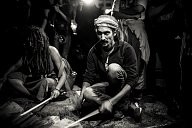
Demonstration in Beirut
Bilal Tarabey / Le Pictorium
LePictorium_0217362.jpg
Musicians doing a performance next to the seat of government. It has been a week now since the Lebanese are demonstrating. From their basic and spontaneous demands (the abolition of the famous Whatsapp and Viber messaging networks user fee project), the movement has since turned into a revolution. Lebanese of all religions and all faiths are gathered in the heart of the capital, recreate the social link between them. Since the end of the civil war, communities have been de facto separated, politically (each has its political party or parties) and geographically. Beirut is divided into homogeneous community neighborhoods, but these barriers have jumped. Everyone is now every night in the city center. And talk to each other This Thursday night the rain reduced the number of participants, but the city remained occupied by the demonstrators, who demand the abolition of the confessional system in place. Some marginal tensions took place, groups said to be related to the Hezbollah who appeared, without flags, but modifying some slogans to spare their leader the popular (verbal) vindictiveness. The speech of the President of the Republic Michel Aoun earlier in the afternoon, mounted, did not calm the protesters. In essence, it refuses any political and institutional change caused by the street. Many rely on this weekend to gather hundreds of thousands of people again. In parallel, a festival atmosphere is created, with its sellers of juice, tea, and even improvised hookah bars.
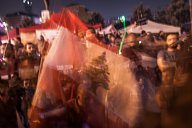
Demonstration in Beirut
Bilal Tarabey / Le Pictorium
LePictorium_0217363.jpg
It has been a week now since the Lebanese are demonstrating. From their basic and spontaneous demands (the abolition of the famous Whatsapp and Viber messaging networks user fee project), the movement has since turned into a revolution. Lebanese of all religions and all faiths are gathered in the heart of the capital, recreate the social link between them. Since the end of the civil war, communities have been de facto separated, politically (each has its political party or parties) and geographically. Beirut is divided into homogeneous community neighborhoods, but these barriers have jumped. Everyone is now every night in the city center. And talk to each other This Thursday night the rain reduced the number of participants, but the city remained occupied by the demonstrators, who demand the abolition of the confessional system in place. Some marginal tensions took place, groups said to be related to the Hezbollah who appeared, without flags, but modifying some slogans to spare their leader the popular (verbal) vindictiveness. The speech of the President of the Republic Michel Aoun earlier in the afternoon, mounted, did not calm the protesters. In essence, it refuses any political and institutional change caused by the street. Many rely on this weekend to gather hundreds of thousands of people again. In parallel, a festival atmosphere is created, with its sellers of juice, tea, and even improvised hookah bars.
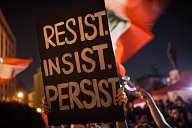
Demonstration in Beirut
Bilal Tarabey / Le Pictorium
LePictorium_0217364.jpg
It has been a week now since the Lebanese are demonstrating. From their basic and spontaneous demands (the abolition of the famous Whatsapp and Viber messaging networks user fee project), the movement has since turned into a revolution. Lebanese of all religions and all faiths are gathered in the heart of the capital, recreate the social link between them. Since the end of the civil war, communities have been de facto separated, politically (each has its political party or parties) and geographically. Beirut is divided into homogeneous community neighborhoods, but these barriers have jumped. Everyone is now every night in the city center. And talk to each other This Thursday night the rain reduced the number of participants, but the city remained occupied by the demonstrators, who demand the abolition of the confessional system in place. Some marginal tensions took place, groups said to be related to the Hezbollah who appeared, without flags, but modifying some slogans to spare their leader the popular (verbal) vindictiveness. The speech of the President of the Republic Michel Aoun earlier in the afternoon, mounted, did not calm the protesters. In essence, it refuses any political and institutional change caused by the street. Many rely on this weekend to gather hundreds of thousands of people again. In parallel, a festival atmosphere is created, with its sellers of juice, tea, and even improvised hookah bars.
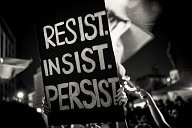
Demonstration in Beirut
Bilal Tarabey / Le Pictorium
LePictorium_0217365.jpg
It has been a week now since the Lebanese are demonstrating. From their basic and spontaneous demands (the abolition of the famous Whatsapp and Viber messaging networks user fee project), the movement has since turned into a revolution. Lebanese of all religions and all faiths are gathered in the heart of the capital, recreate the social link between them. Since the end of the civil war, communities have been de facto separated, politically (each has its political party or parties) and geographically. Beirut is divided into homogeneous community neighborhoods, but these barriers have jumped. Everyone is now every night in the city center. And talk to each other This Thursday night the rain reduced the number of participants, but the city remained occupied by the demonstrators, who demand the abolition of the confessional system in place. Some marginal tensions took place, groups said to be related to the Hezbollah who appeared, without flags, but modifying some slogans to spare their leader the popular (verbal) vindictiveness. The speech of the President of the Republic Michel Aoun earlier in the afternoon, mounted, did not calm the protesters. In essence, it refuses any political and institutional change caused by the street. Many rely on this weekend to gather hundreds of thousands of people again. In parallel, a festival atmosphere is created, with its sellers of juice, tea, and even improvised hookah bars.
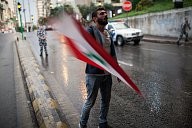
Demonstration in Beirut
Bilal Tarabey / Le Pictorium
LePictorium_0217366.jpg
A protester prevents cars from passing to downtown Beirut. he is watched by a policeman. It has been a week now since the Lebanese are demonstrating. From their basic and spontaneous demands (the abolition of the famous Whatsapp and Viber messaging networks user fee project), the movement has since turned into a revolution. Lebanese of all religions and all faiths are gathered in the heart of the capital, recreate the social link between them. Since the end of the civil war, communities have been de facto separated, politically (each has its political party or parties) and geographically. Beirut is divided into homogeneous community neighborhoods, but these barriers have jumped. Everyone is now every night in the city center. And talk to each other This Thursday night the rain reduced the number of participants, but the city remained occupied by the demonstrators, who demand the abolition of the confessional system in place. Some marginal tensions took place, groups said to be related to the Hezbollah who appeared, without flags, but modifying some slogans to spare their leader the popular (verbal) vindictiveness. The speech of the President of the Republic Michel Aoun earlier in the afternoon, mounted, did not calm the protesters. In essence, it refuses any political and institutional change caused by the street. Many rely on this weekend to gather hundreds of thousands of people again. In parallel, a festival atmosphere is created, with its sellers of juice, tea, and even improvised hookah bars.
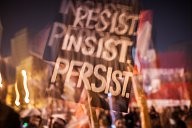
Demonstration in Beirut
Bilal Tarabey / Le Pictorium
LePictorium_0217367.jpg
It has been a week now since the Lebanese are demonstrating. From their basic and spontaneous demands (the abolition of the famous Whatsapp and Viber messaging networks user fee project), the movement has since turned into a revolution. Lebanese of all religions and all faiths are gathered in the heart of the capital, recreate the social link between them. Since the end of the civil war, communities have been de facto separated, politically (each has its political party or parties) and geographically. Beirut is divided into homogeneous community neighborhoods, but these barriers have jumped. Everyone is now every night in the city center. And talk to each other This Thursday night the rain reduced the number of participants, but the city remained occupied by the demonstrators, who demand the abolition of the confessional system in place. Some marginal tensions took place, groups said to be related to the Hezbollah who appeared, without flags, but modifying some slogans to spare their leader the popular (verbal) vindictiveness. The speech of the President of the Republic Michel Aoun earlier in the afternoon, mounted, did not calm the protesters. In essence, it refuses any political and institutional change caused by the street. Many rely on this weekend to gather hundreds of thousands of people again. In parallel, a festival atmosphere is created, with its sellers of juice, tea, and even improvised hookah bars.
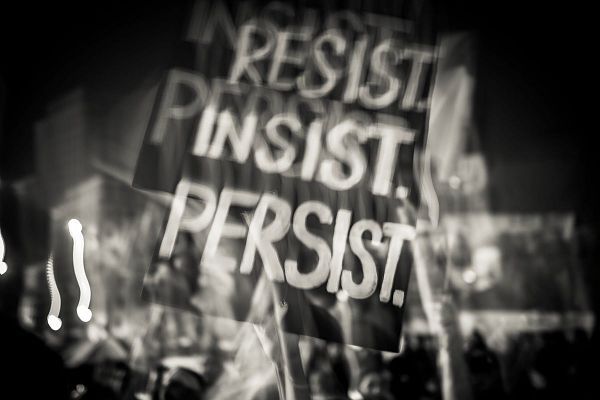
Demonstration in Beirut
Bilal Tarabey / Le Pictorium
LePictorium_0217368.jpg
It has been a week now since the Lebanese are demonstrating. From their basic and spontaneous demands (the abolition of the famous Whatsapp and Viber messaging networks user fee project), the movement has since turned into a revolution. Lebanese of all religions and all faiths are gathered in the heart of the capital, recreate the social link between them. Since the end of the civil war, communities have been de facto separated, politically (each has its political party or parties) and geographically. Beirut is divided into homogeneous community neighborhoods, but these barriers have jumped. Everyone is now every night in the city center. And talk to each other This Thursday night the rain reduced the number of participants, but the city remained occupied by the demonstrators, who demand the abolition of the confessional system in place. Some marginal tensions took place, groups said to be related to the Hezbollah who appeared, without flags, but modifying some slogans to spare their leader the popular (verbal) vindictiveness. The speech of the President of the Republic Michel Aoun earlier in the afternoon, mounted, did not calm the protesters. In essence, it refuses any political and institutional change caused by the street. Many rely on this weekend to gather hundreds of thousands of people again. In parallel, a festival atmosphere is created, with its sellers of juice, tea, and even improvised hookah bars.
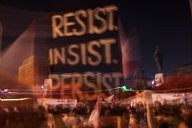
Demonstration in Beirut
Bilal Tarabey / Le Pictorium
LePictorium_0217369.jpg
It has been a week now since the Lebanese are demonstrating. From their basic and spontaneous demands (the abolition of the famous Whatsapp and Viber messaging networks user fee project), the movement has since turned into a revolution. Lebanese of all religions and all faiths are gathered in the heart of the capital, recreate the social link between them. Since the end of the civil war, communities have been de facto separated, politically (each has its political party or parties) and geographically. Beirut is divided into homogeneous community neighborhoods, but these barriers have jumped. Everyone is now every night in the city center. And talk to each other This Thursday night the rain reduced the number of participants, but the city remained occupied by the demonstrators, who demand the abolition of the confessional system in place. Some marginal tensions took place, groups said to be related to the Hezbollah who appeared, without flags, but modifying some slogans to spare their leader the popular (verbal) vindictiveness. The speech of the President of the Republic Michel Aoun earlier in the afternoon, mounted, did not calm the protesters. In essence, it refuses any political and institutional change caused by the street. Many rely on this weekend to gather hundreds of thousands of people again. In parallel, a festival atmosphere is created, with its sellers of juice, tea, and even improvised hookah bars.
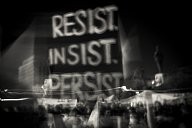
Demonstration in Beirut
Bilal Tarabey / Le Pictorium
LePictorium_0217370.jpg
It has been a week now since the Lebanese are demonstrating. From their basic and spontaneous demands (the abolition of the famous Whatsapp and Viber messaging networks user fee project), the movement has since turned into a revolution. Lebanese of all religions and all faiths are gathered in the heart of the capital, recreate the social link between them. Since the end of the civil war, communities have been de facto separated, politically (each has its political party or parties) and geographically. Beirut is divided into homogeneous community neighborhoods, but these barriers have jumped. Everyone is now every night in the city center. And talk to each other This Thursday night the rain reduced the number of participants, but the city remained occupied by the demonstrators, who demand the abolition of the confessional system in place. Some marginal tensions took place, groups said to be related to the Hezbollah who appeared, without flags, but modifying some slogans to spare their leader the popular (verbal) vindictiveness. The speech of the President of the Republic Michel Aoun earlier in the afternoon, mounted, did not calm the protesters. In essence, it refuses any political and institutional change caused by the street. Many rely on this weekend to gather hundreds of thousands of people again. In parallel, a festival atmosphere is created, with its sellers of juice, tea, and even improvised hookah bars.
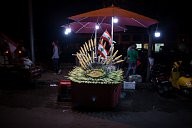
Demonstration in Beirut
Bilal Tarabey / Le Pictorium
LePictorium_0217371.jpg
It has been a week now since the Lebanese are demonstrating. From their basic and spontaneous demands (the abolition of the famous Whatsapp and Viber messaging networks user fee project), the movement has since turned into a revolution. Lebanese of all religions and all faiths are gathered in the heart of the capital, recreate the social link between them. Since the end of the civil war, communities have been de facto separated, politically (each has its political party or parties) and geographically. Beirut is divided into homogeneous community neighborhoods, but these barriers have jumped. Everyone is now every night in the city center. And talk to each other This Thursday night the rain reduced the number of participants, but the city remained occupied by the demonstrators, who demand the abolition of the confessional system in place. Some marginal tensions took place, groups said to be related to the Hezbollah who appeared, without flags, but modifying some slogans to spare their leader the popular (verbal) vindictiveness. The speech of the President of the Republic Michel Aoun earlier in the afternoon, mounted, did not calm the protesters. In essence, it refuses any political and institutional change caused by the street. Many rely on this weekend to gather hundreds of thousands of people again. In parallel, a festival atmosphere is created, with its sellers of juice, tea, and even improvised hookah bars.
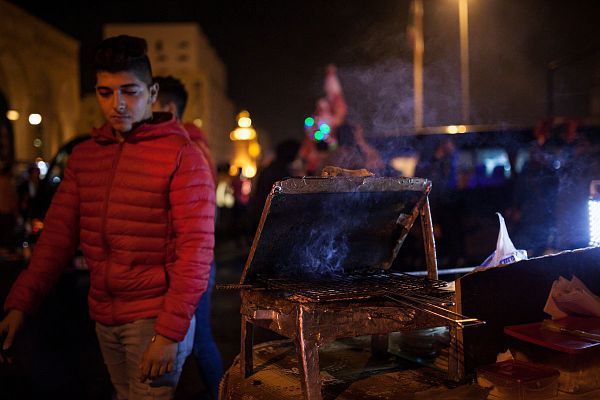
Demonstration in Beirut
Bilal Tarabey / Le Pictorium
LePictorium_0217372.jpg
It has been a week now since the Lebanese are demonstrating. From their basic and spontaneous demands (the abolition of the famous Whatsapp and Viber messaging networks user fee project), the movement has since turned into a revolution. Lebanese of all religions and all faiths are gathered in the heart of the capital, recreate the social link between them. Since the end of the civil war, communities have been de facto separated, politically (each has its political party or parties) and geographically. Beirut is divided into homogeneous community neighborhoods, but these barriers have jumped. Everyone is now every night in the city center. And talk to each other This Thursday night the rain reduced the number of participants, but the city remained occupied by the demonstrators, who demand the abolition of the confessional system in place. Some marginal tensions took place, groups said to be related to the Hezbollah who appeared, without flags, but modifying some slogans to spare their leader the popular (verbal) vindictiveness. The speech of the President of the Republic Michel Aoun earlier in the afternoon, mounted, did not calm the protesters. In essence, it refuses any political and institutional change caused by the street. Many rely on this weekend to gather hundreds of thousands of people again. In parallel, a festival atmosphere is created, with its sellers of juice, tea, and even improvised hookah bars.
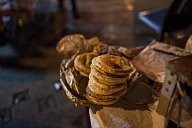
Demonstration in Beirut
Bilal Tarabey / Le Pictorium
LePictorium_0217373.jpg
The -kaak-, a hot sesame bread filled with cheese. a Lebanese street specialty. It has been a week now since the Lebanese are demonstrating. From their basic and spontaneous demands (the abolition of the famous Whatsapp and Viber messaging networks user fee project), the movement has since turned into a revolution. Lebanese of all religions and all faiths are gathered in the heart of the capital, recreate the social link between them. Since the end of the civil war, communities have been de facto separated, politically (each has its political party or parties) and geographically. Beirut is divided into homogeneous community neighborhoods, but these barriers have jumped. Everyone is now every night in the city center. And talk to each other This Thursday night the rain reduced the number of participants, but the city remained occupied by the demonstrators, who demand the abolition of the confessional system in place. Some marginal tensions took place, groups said to be related to the Hezbollah who appeared, without flags, but modifying some slogans to spare their leader the popular (verbal) vindictiveness. The speech of the President of the Republic Michel Aoun earlier in the afternoon, mounted, did not calm the protesters. In essence, it refuses any political and institutional change caused by the street. Many rely on this weekend to gather hundreds of thousands of people again. In parallel, a festival atmosphere is created, with its sellers of juice, tea, and even improvised hookah bars.
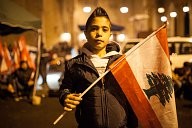
Demonstration in Beirut
Bilal Tarabey / Le Pictorium
LePictorium_0217374.jpg
A Shiite teenager from the Bekaa. It has been a week now since the Lebanese are demonstrating. From their basic and spontaneous demands (the abolition of the famous Whatsapp and Viber messaging networks user fee project), the movement has since turned into a revolution. Lebanese of all religions and all faiths are gathered in the heart of the capital, recreate the social link between them. Since the end of the civil war, communities have been de facto separated, politically (each has its political party or parties) and geographically. Beirut is divided into homogeneous community neighborhoods, but these barriers have jumped. Everyone is now every night in the city center. And talk to each other This Thursday night the rain reduced the number of participants, but the city remained occupied by the demonstrators, who demand the abolition of the confessional system in place. Some marginal tensions took place, groups said to be related to the Hezbollah who appeared, without flags, but modifying some slogans to spare their leader the popular (verbal) vindictiveness. The speech of the President of the Republic Michel Aoun earlier in the afternoon, mounted, did not calm the protesters. In essence, it refuses any political and institutional change caused by the street. Many rely on this weekend to gather hundreds of thousands of people again. In parallel, a festival atmosphere is created, with its sellers of juice, tea, and even improvised hookah bars.
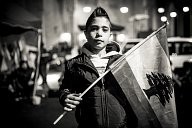
Demonstration in Beirut
Bilal Tarabey / Le Pictorium
LePictorium_0217375.jpg
A Shiite teenager from the Bekaa. It has been a week now since the Lebanese are demonstrating. From their basic and spontaneous demands (the abolition of the famous Whatsapp and Viber messaging networks user fee project), the movement has since turned into a revolution. Lebanese of all religions and all faiths are gathered in the heart of the capital, recreate the social link between them. Since the end of the civil war, communities have been de facto separated, politically (each has its political party or parties) and geographically. Beirut is divided into homogeneous community neighborhoods, but these barriers have jumped. Everyone is now every night in the city center. And talk to each other This Thursday night the rain reduced the number of participants, but the city remained occupied by the demonstrators, who demand the abolition of the confessional system in place. Some marginal tensions took place, groups said to be related to the Hezbollah who appeared, without flags, but modifying some slogans to spare their leader the popular (verbal) vindictiveness. The speech of the President of the Republic Michel Aoun earlier in the afternoon, mounted, did not calm the protesters. In essence, it refuses any political and institutional change caused by the street. Many rely on this weekend to gather hundreds of thousands of people again. In parallel, a festival atmosphere is created, with its sellers of juice, tea, and even improvised hookah bars.
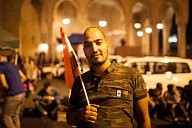
Demonstration in Beirut
Bilal Tarabey / Le Pictorium
LePictorium_0217376.jpg
A Lebanese Shiite from the Bekaa. It has been a week now since the Lebanese are demonstrating. From their basic and spontaneous demands (the abolition of the famous Whatsapp and Viber messaging networks user fee project), the movement has since turned into a revolution. Lebanese of all religions and all faiths are gathered in the heart of the capital, recreate the social link between them. Since the end of the civil war, communities have been de facto separated, politically (each has its political party or parties) and geographically. Beirut is divided into homogeneous community neighborhoods, but these barriers have jumped. Everyone is now every night in the city center. And talk to each other This Thursday night the rain reduced the number of participants, but the city remained occupied by the demonstrators, who demand the abolition of the confessional system in place. Some marginal tensions took place, groups said to be related to the Hezbollah who appeared, without flags, but modifying some slogans to spare their leader the popular (verbal) vindictiveness. The speech of the President of the Republic Michel Aoun earlier in the afternoon, mounted, did not calm the protesters. In essence, it refuses any political and institutional change caused by the street. Many rely on this weekend to gather hundreds of thousands of people again. In parallel, a festival atmosphere is created, with its sellers of juice, tea, and even improvised hookah bars.
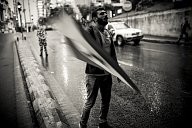
Demonstration in Beirut
Bilal Tarabey / Le Pictorium
LePictorium_0217377.jpg
A protester prevents cars from passing to downtown Beirut. he is watched by a policeman.It has been a week now since the Lebanese are demonstrating. From their basic and spontaneous demands (the abolition of the famous Whatsapp and Viber messaging networks user fee project), the movement has since turned into a revolution. Lebanese of all religions and all faiths are gathered in the heart of the capital, recreate the social link between them. Since the end of the civil war, communities have been de facto separated, politically (each has its political party or parties) and geographically. Beirut is divided into homogeneous community neighborhoods, but these barriers have jumped. Everyone is now every night in the city center. And talk to each other This Thursday night the rain reduced the number of participants, but the city remained occupied by the demonstrators, who demand the abolition of the confessional system in place. Some marginal tensions took place, groups said to be related to the Hezbollah who appeared, without flags, but modifying some slogans to spare their leader the popular (verbal) vindictiveness. The speech of the President of the Republic Michel Aoun earlier in the afternoon, mounted, did not calm the protesters. In essence, it refuses any political and institutional change caused by the street. Many rely on this weekend to gather hundreds of thousands of people again. In parallel, a festival atmosphere is created, with its sellers of juice, tea, and even improvised hookah bars.
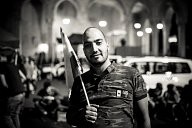
Demonstration in Beirut
Bilal Tarabey / Le Pictorium
LePictorium_0217378.jpg
A Lebanese Shiite from the Bekaa. It has been a week now since the Lebanese are demonstrating. From their basic and spontaneous demands (the abolition of the famous Whatsapp and Viber messaging networks user fee project), the movement has since turned into a revolution. Lebanese of all religions and all faiths are gathered in the heart of the capital, recreate the social link between them. Since the end of the civil war, communities have been de facto separated, politically (each has its political party or parties) and geographically. Beirut is divided into homogeneous community neighborhoods, but these barriers have jumped. Everyone is now every night in the city center. And talk to each other This Thursday night the rain reduced the number of participants, but the city remained occupied by the demonstrators, who demand the abolition of the confessional system in place. Some marginal tensions took place, groups said to be related to the Hezbollah who appeared, without flags, but modifying some slogans to spare their leader the popular (verbal) vindictiveness. The speech of the President of the Republic Michel Aoun earlier in the afternoon, mounted, did not calm the protesters. In essence, it refuses any political and institutional change caused by the street. Many rely on this weekend to gather hundreds of thousands of people again. In parallel, a festival atmosphere is created, with its sellers of juice, tea, and even improvised hookah bars.
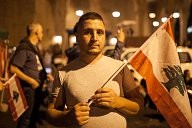
Demonstration in Beirut
Bilal Tarabey / Le Pictorium
LePictorium_0217379.jpg
A Lebanese Shiite from the Bekaa. It has been a week now since the Lebanese are demonstrating. From their basic and spontaneous demands (the abolition of the famous Whatsapp and Viber messaging networks user fee project), the movement has since turned into a revolution. Lebanese of all religions and all faiths are gathered in the heart of the capital, recreate the social link between them. Since the end of the civil war, communities have been de facto separated, politically (each has its political party or parties) and geographically. Beirut is divided into homogeneous community neighborhoods, but these barriers have jumped. Everyone is now every night in the city center. And talk to each other This Thursday night the rain reduced the number of participants, but the city remained occupied by the demonstrators, who demand the abolition of the confessional system in place. Some marginal tensions took place, groups said to be related to the Hezbollah who appeared, without flags, but modifying some slogans to spare their leader the popular (verbal) vindictiveness. The speech of the President of the Republic Michel Aoun earlier in the afternoon, mounted, did not calm the protesters. In essence, it refuses any political and institutional change caused by the street. Many rely on this weekend to gather hundreds of thousands of people again. In parallel, a festival atmosphere is created, with its sellers of juice, tea, and even improvised hookah bars.

Demonstration in Beirut
Bilal Tarabey / Le Pictorium
LePictorium_0217380.jpg
A Lebanese Shiite from the Bekaa. It has been a week now since the Lebanese are demonstrating. From their basic and spontaneous demands (the abolition of the famous Whatsapp and Viber messaging networks user fee project), the movement has since turned into a revolution. Lebanese of all religions and all faiths are gathered in the heart of the capital, recreate the social link between them. Since the end of the civil war, communities have been de facto separated, politically (each has its political party or parties) and geographically. Beirut is divided into homogeneous community neighborhoods, but these barriers have jumped. Everyone is now every night in the city center. And talk to each other This Thursday night the rain reduced the number of participants, but the city remained occupied by the demonstrators, who demand the abolition of the confessional system in place. Some marginal tensions took place, groups said to be related to the Hezbollah who appeared, without flags, but modifying some slogans to spare their leader the popular (verbal) vindictiveness. The speech of the President of the Republic Michel Aoun earlier in the afternoon, mounted, did not calm the protesters. In essence, it refuses any political and institutional change caused by the street. Many rely on this weekend to gather hundreds of thousands of people again. In parallel, a festival atmosphere is created, with its sellers of juice, tea, and even improvised hookah bars.
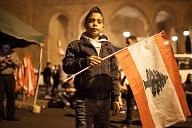
Demonstration in Beirut
Bilal Tarabey / Le Pictorium
LePictorium_0217381.jpg
A Shiite teenager from the Bekaa. It has been a week now since the Lebanese are demonstrating. From their basic and spontaneous demands (the abolition of the famous Whatsapp and Viber messaging networks user fee project), the movement has since turned into a revolution. Lebanese of all religions and all faiths are gathered in the heart of the capital, recreate the social link between them. Since the end of the civil war, communities have been de facto separated, politically (each has its political party or parties) and geographically. Beirut is divided into homogeneous community neighborhoods, but these barriers have jumped. Everyone is now every night in the city center. And talk to each other This Thursday night the rain reduced the number of participants, but the city remained occupied by the demonstrators, who demand the abolition of the confessional system in place. Some marginal tensions took place, groups said to be related to the Hezbollah who appeared, without flags, but modifying some slogans to spare their leader the popular (verbal) vindictiveness. The speech of the President of the Republic Michel Aoun earlier in the afternoon, mounted, did not calm the protesters. In essence, it refuses any political and institutional change caused by the street. Many rely on this weekend to gather hundreds of thousands of people again. In parallel, a festival atmosphere is created, with its sellers of juice, tea, and even improvised hookah bars.
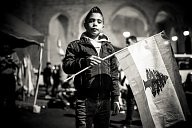
Demonstration in Beirut
Bilal Tarabey / Le Pictorium
LePictorium_0217382.jpg
A Shiite teenager from the Bekaa. It has been a week now since the Lebanese are demonstrating. From their basic and spontaneous demands (the abolition of the famous Whatsapp and Viber messaging networks user fee project), the movement has since turned into a revolution. Lebanese of all religions and all faiths are gathered in the heart of the capital, recreate the social link between them. Since the end of the civil war, communities have been de facto separated, politically (each has its political party or parties) and geographically. Beirut is divided into homogeneous community neighborhoods, but these barriers have jumped. Everyone is now every night in the city center. And talk to each other This Thursday night the rain reduced the number of participants, but the city remained occupied by the demonstrators, who demand the abolition of the confessional system in place. Some marginal tensions took place, groups said to be related to the Hezbollah who appeared, without flags, but modifying some slogans to spare their leader the popular (verbal) vindictiveness. The speech of the President of the Republic Michel Aoun earlier in the afternoon, mounted, did not calm the protesters. In essence, it refuses any political and institutional change caused by the street. Many rely on this weekend to gather hundreds of thousands of people again. In parallel, a festival atmosphere is created, with its sellers of juice, tea, and even improvised hookah bars.
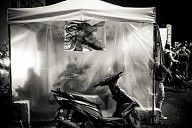
Demonstration in Beirut
Bilal Tarabey / Le Pictorium
LePictorium_0217383.jpg
It has been a week now since the Lebanese are demonstrating. From their basic and spontaneous demands (the abolition of the famous Whatsapp and Viber messaging networks user fee project), the movement has since turned into a revolution. Lebanese of all religions and all faiths are gathered in the heart of the capital, recreate the social link between them. Since the end of the civil war, communities have been de facto separated, politically (each has its political party or parties) and geographically. Beirut is divided into homogeneous community neighborhoods, but these barriers have jumped. Everyone is now every night in the city center. And talk to each other This Thursday night the rain reduced the number of participants, but the city remained occupied by the demonstrators, who demand the abolition of the confessional system in place. Some marginal tensions took place, groups said to be related to the Hezbollah who appeared, without flags, but modifying some slogans to spare their leader the popular (verbal) vindictiveness. The speech of the President of the Republic Michel Aoun earlier in the afternoon, mounted, did not calm the protesters. In essence, it refuses any political and institutional change caused by the street. Many rely on this weekend to gather hundreds of thousands of people again. In parallel, a festival atmosphere is created, with its sellers of juice, tea, and even improvised hookah bars.
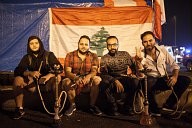
Demonstration in Beirut
Bilal Tarabey / Le Pictorium
LePictorium_0217384.jpg
Sunni Lebanese from West Beirut. It has been a week now since the Lebanese are demonstrating. From their basic and spontaneous demands (the abolition of the famous Whatsapp and Viber messaging networks user fee project), the movement has since turned into a revolution. Lebanese of all religions and all faiths are gathered in the heart of the capital, recreate the social link between them. Since the end of the civil war, communities have been de facto separated, politically (each has its political party or parties) and geographically. Beirut is divided into homogeneous community neighborhoods, but these barriers have jumped. Everyone is now every night in the city center. And talk to each other This Thursday night the rain reduced the number of participants, but the city remained occupied by the demonstrators, who demand the abolition of the confessional system in place. Some marginal tensions took place, groups said to be related to the Hezbollah who appeared, without flags, but modifying some slogans to spare their leader the popular (verbal) vindictiveness. The speech of the President of the Republic Michel Aoun earlier in the afternoon, mounted, did not calm the protesters. In essence, it refuses any political and institutional change caused by the street. Many rely on this weekend to gather hundreds of thousands of people again. In parallel, a festival atmosphere is created, with its sellers of juice, tea, and even improvised hookah bars.
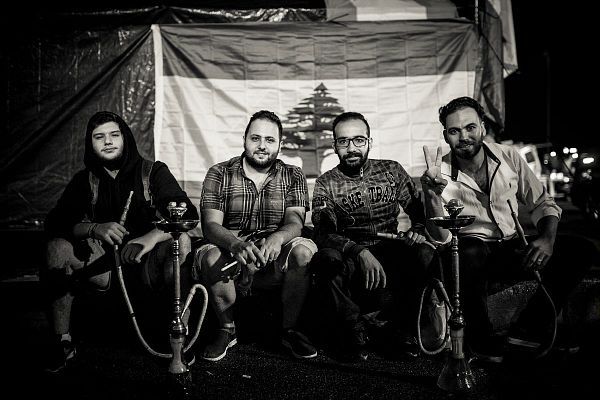
Demonstration in Beirut
Bilal Tarabey / Le Pictorium
LePictorium_0217385.jpg
Sunni Lebanese from West Beirut. It has been a week now since the Lebanese are demonstrating. From their basic and spontaneous demands (the abolition of the famous Whatsapp and Viber messaging networks user fee project), the movement has since turned into a revolution. Lebanese of all religions and all faiths are gathered in the heart of the capital, recreate the social link between them. Since the end of the civil war, communities have been de facto separated, politically (each has its political party or parties) and geographically. Beirut is divided into homogeneous community neighborhoods, but these barriers have jumped. Everyone is now every night in the city center. And talk to each other This Thursday night the rain reduced the number of participants, but the city remained occupied by the demonstrators, who demand the abolition of the confessional system in place. Some marginal tensions took place, groups said to be related to the Hezbollah who appeared, without flags, but modifying some slogans to spare their leader the popular (verbal) vindictiveness. The speech of the President of the Republic Michel Aoun earlier in the afternoon, mounted, did not calm the protesters. In essence, it refuses any political and institutional change caused by the street. Many rely on this weekend to gather hundreds of thousands of people again. In parallel, a festival atmosphere is created, with its sellers of juice, tea, and even improvised hookah bars.
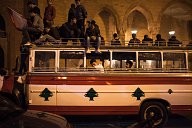
Demonstration in Beirut
Bilal Tarabey / Le Pictorium
LePictorium_0217386.jpg
It has been a week now since the Lebanese are demonstrating. From their basic and spontaneous demands (the abolition of the famous Whatsapp and Viber messaging networks user fee project), the movement has since turned into a revolution. Lebanese of all religions and all faiths are gathered in the heart of the capital, recreate the social link between them. Since the end of the civil war, communities have been de facto separated, politically (each has its political party or parties) and geographically. Beirut is divided into homogeneous community neighborhoods, but these barriers have jumped. Everyone is now every night in the city center. And talk to each other This Thursday night the rain reduced the number of participants, but the city remained occupied by the demonstrators, who demand the abolition of the confessional system in place. Some marginal tensions took place, groups said to be related to the Hezbollah who appeared, without flags, but modifying some slogans to spare their leader the popular (verbal) vindictiveness. The speech of the President of the Republic Michel Aoun earlier in the afternoon, mounted, did not calm the protesters. In essence, it refuses any political and institutional change caused by the street. Many rely on this weekend to gather hundreds of thousands of people again. In parallel, a festival atmosphere is created, with its sellers of juice, tea, and even improvised hookah bars.

Demonstration in Beirut
Bilal Tarabey / Le Pictorium
LePictorium_0217387.jpg
It has been a week now since the Lebanese are demonstrating. From their basic and spontaneous demands (the abolition of the famous Whatsapp and Viber messaging networks user fee project), the movement has since turned into a revolution. Lebanese of all religions and all faiths are gathered in the heart of the capital, recreate the social link between them. Since the end of the civil war, communities have been de facto separated, politically (each has its political party or parties) and geographically. Beirut is divided into homogeneous community neighborhoods, but these barriers have jumped. Everyone is now every night in the city center. And talk to each other This Thursday night the rain reduced the number of participants, but the city remained occupied by the demonstrators, who demand the abolition of the confessional system in place. Some marginal tensions took place, groups said to be related to the Hezbollah who appeared, without flags, but modifying some slogans to spare their leader the popular (verbal) vindictiveness. The speech of the President of the Republic Michel Aoun earlier in the afternoon, mounted, did not calm the protesters. In essence, it refuses any political and institutional change caused by the street. Many rely on this weekend to gather hundreds of thousands of people again. In parallel, a festival atmosphere is created, with its sellers of juice, tea, and even improvised hookah bars.

Demonstration in Beirut
Bilal Tarabey / Le Pictorium
LePictorium_0217388.jpg
It has been a week now since the Lebanese are demonstrating. From their basic and spontaneous demands (the abolition of the famous Whatsapp and Viber messaging networks user fee project), the movement has since turned into a revolution. Lebanese of all religions and all faiths are gathered in the heart of the capital, recreate the social link between them. Since the end of the civil war, communities have been de facto separated, politically (each has its political party or parties) and geographically. Beirut is divided into homogeneous community neighborhoods, but these barriers have jumped. Everyone is now every night in the city center. And talk to each other This Thursday night the rain reduced the number of participants, but the city remained occupied by the demonstrators, who demand the abolition of the confessional system in place. Some marginal tensions took place, groups said to be related to the Hezbollah who appeared, without flags, but modifying some slogans to spare their leader the popular (verbal) vindictiveness. The speech of the President of the Republic Michel Aoun earlier in the afternoon, mounted, did not calm the protesters. In essence, it refuses any political and institutional change caused by the street. Many rely on this weekend to gather hundreds of thousands of people again. In parallel, a festival atmosphere is created, with its sellers of juice, tea, and even improvised hookah bars.
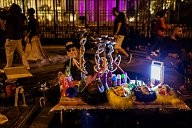
Demonstration in Beirut
Bilal Tarabey / Le Pictorium
LePictorium_0217389.jpg
It has been a week now since the Lebanese are demonstrating. From their basic and spontaneous demands (the abolition of the famous Whatsapp and Viber messaging networks user fee project), the movement has since turned into a revolution. Lebanese of all religions and all faiths are gathered in the heart of the capital, recreate the social link between them. Since the end of the civil war, communities have been de facto separated, politically (each has its political party or parties) and geographically. Beirut is divided into homogeneous community neighborhoods, but these barriers have jumped. Everyone is now every night in the city center. And talk to each other This Thursday night the rain reduced the number of participants, but the city remained occupied by the demonstrators, who demand the abolition of the confessional system in place. Some marginal tensions took place, groups said to be related to the Hezbollah who appeared, without flags, but modifying some slogans to spare their leader the popular (verbal) vindictiveness. The speech of the President of the Republic Michel Aoun earlier in the afternoon, mounted, did not calm the protesters. In essence, it refuses any political and institutional change caused by the street. Many rely on this weekend to gather hundreds of thousands of people again. In parallel, a festival atmosphere is created, with its sellers of juice, tea, and even improvised hookah bars.
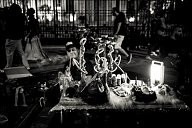
Demonstration in Beirut
Bilal Tarabey / Le Pictorium
LePictorium_0217390.jpg
It has been a week now since the Lebanese are demonstrating. From their basic and spontaneous demands (the abolition of the famous Whatsapp and Viber messaging networks user fee project), the movement has since turned into a revolution. Lebanese of all religions and all faiths are gathered in the heart of the capital, recreate the social link between them. Since the end of the civil war, communities have been de facto separated, politically (each has its political party or parties) and geographically. Beirut is divided into homogeneous community neighborhoods, but these barriers have jumped. Everyone is now every night in the city center. And talk to each other This Thursday night the rain reduced the number of participants, but the city remained occupied by the demonstrators, who demand the abolition of the confessional system in place. Some marginal tensions took place, groups said to be related to the Hezbollah who appeared, without flags, but modifying some slogans to spare their leader the popular (verbal) vindictiveness. The speech of the President of the Republic Michel Aoun earlier in the afternoon, mounted, did not calm the protesters. In essence, it refuses any political and institutional change caused by the street. Many rely on this weekend to gather hundreds of thousands of people again. In parallel, a festival atmosphere is created, with its sellers of juice, tea, and even improvised hookah bars.
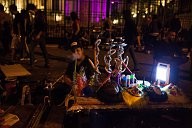
Demonstration in Beirut
Bilal Tarabey / Le Pictorium
LePictorium_0217391.jpg
It has been a week now since the Lebanese are demonstrating. From their basic and spontaneous demands (the abolition of the famous Whatsapp and Viber messaging networks user fee project), the movement has since turned into a revolution. Lebanese of all religions and all faiths are gathered in the heart of the capital, recreate the social link between them. Since the end of the civil war, communities have been de facto separated, politically (each has its political party or parties) and geographically. Beirut is divided into homogeneous community neighborhoods, but these barriers have jumped. Everyone is now every night in the city center. And talk to each other This Thursday night the rain reduced the number of participants, but the city remained occupied by the demonstrators, who demand the abolition of the confessional system in place. Some marginal tensions took place, groups said to be related to the Hezbollah who appeared, without flags, but modifying some slogans to spare their leader the popular (verbal) vindictiveness. The speech of the President of the Republic Michel Aoun earlier in the afternoon, mounted, did not calm the protesters. In essence, it refuses any political and institutional change caused by the street. Many rely on this weekend to gather hundreds of thousands of people again. In parallel, a festival atmosphere is created, with its sellers of juice, tea, and even improvised hookah bars.
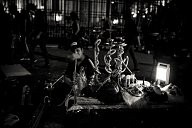
Demonstration in Beirut
Bilal Tarabey / Le Pictorium
LePictorium_0217392.jpg
It has been a week now since the Lebanese are demonstrating. From their basic and spontaneous demands (the abolition of the famous Whatsapp and Viber messaging networks user fee project), the movement has since turned into a revolution. Lebanese of all religions and all faiths are gathered in the heart of the capital, recreate the social link between them. Since the end of the civil war, communities have been de facto separated, politically (each has its political party or parties) and geographically. Beirut is divided into homogeneous community neighborhoods, but these barriers have jumped. Everyone is now every night in the city center. And talk to each other This Thursday night the rain reduced the number of participants, but the city remained occupied by the demonstrators, who demand the abolition of the confessional system in place. Some marginal tensions took place, groups said to be related to the Hezbollah who appeared, without flags, but modifying some slogans to spare their leader the popular (verbal) vindictiveness. The speech of the President of the Republic Michel Aoun earlier in the afternoon, mounted, did not calm the protesters. In essence, it refuses any political and institutional change caused by the street. Many rely on this weekend to gather hundreds of thousands of people again. In parallel, a festival atmosphere is created, with its sellers of juice, tea, and even improvised hookah bars.
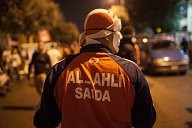
Demonstration in Beirut
Bilal Tarabey / Le Pictorium
LePictorium_0217393.jpg
A protester wears the colors of the football team of saida, a Sunni city south of Beirut, bastion of Prime Minister Saad Hariri. It has been a week now since the Lebanese are demonstrating. From their basic and spontaneous demands (the abolition of the famous Whatsapp and Viber messaging networks user fee project), the movement has since turned into a revolution. Lebanese of all religions and all faiths are gathered in the heart of the capital, recreate the social link between them. Since the end of the civil war, communities have been de facto separated, politically (each has its political party or parties) and geographically. Beirut is divided into homogeneous community neighborhoods, but these barriers have jumped. Everyone is now every night in the city center. And talk to each other This Thursday night the rain reduced the number of participants, but the city remained occupied by the demonstrators, who demand the abolition of the confessional system in place. Some marginal tensions took place, groups said to be related to the Hezbollah who appeared, without flags, but modifying some slogans to spare their leader the popular (verbal) vindictiveness. The speech of the President of the Republic Michel Aoun earlier in the afternoon, mounted, did not calm the protesters. In essence, it refuses any political and institutional change caused by the street. Many rely on this weekend to gather hundreds of thousands of people again. In parallel, a festival atmosphere is created, with its sellers of juice, tea, and even improvised hookah bars.
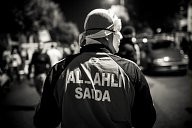
Demonstration in Beirut
Bilal Tarabey / Le Pictorium
LePictorium_0217355.jpg
A protester wears the colors of the football team of saida, a Sunni city south of Beirut, bastion of Prime Minister Saad Hariri. It has been a week now since the Lebanese are demonstrating. From their basic and spontaneous demands (the abolition of the famous Whatsapp and Viber messaging networks user fee project), the movement has since turned into a revolution. Lebanese of all religions and all faiths are gathered in the heart of the capital, recreate the social link between them. Since the end of the civil war, communities have been de facto separated, politically (each has its political party or parties) and geographically. Beirut is divided into homogeneous community neighborhoods, but these barriers have jumped. Everyone is now every night in the city center. And talk to each other This Thursday night the rain reduced the number of participants, but the city remained occupied by the demonstrators, who demand the abolition of the confessional system in place. Some marginal tensions took place, groups said to be related to the Hezbollah who appeared, without flags, but modifying some slogans to spare their leader the popular (verbal) vindictiveness. The speech of the President of the Republic Michel Aoun earlier in the afternoon, mounted, did not calm the protesters. In essence, it refuses any political and institutional change caused by the street. Many rely on this weekend to gather hundreds of thousands of people again. In parallel, a festival atmosphere is created, with its sellers of juice, tea, and even improvised hookah bars.
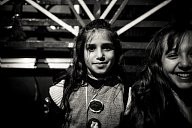
Demonstration in Beirut
Bilal Tarabey / Le Pictorium
LePictorium_0217356.jpg
It has been a week now since the Lebanese are demonstrating. From their basic and spontaneous demands (the abolition of the famous Whatsapp and Viber messaging networks user fee project), the movement has since turned into a revolution. Lebanese of all religions and all faiths are gathered in the heart of the capital, recreate the social link between them. Since the end of the civil war, communities have been de facto separated, politically (each has its political party or parties) and geographically. Beirut is divided into homogeneous community neighborhoods, but these barriers have jumped. Everyone is now every night in the city center. And talk to each other This Thursday night the rain reduced the number of participants, but the city remained occupied by the demonstrators, who demand the abolition of the confessional system in place. Some marginal tensions took place, groups said to be related to the Hezbollah who appeared, without flags, but modifying some slogans to spare their leader the popular (verbal) vindictiveness. The speech of the President of the Republic Michel Aoun earlier in the afternoon, mounted, did not calm the protesters. In essence, it refuses any political and institutional change caused by the street. Many rely on this weekend to gather hundreds of thousands of people again. In parallel, a festival atmosphere is created, with its sellers of juice, tea, and even improvised hookah bars.
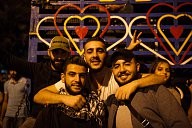
Demonstration in Beirut
Bilal Tarabey / Le Pictorium
LePictorium_0217357.jpg
Shiite residents of the southern suburbs of Beirut, stronghold of the Hezbollah, protest with the protesters. This is the first time since the civil war that the Shia community has joined an anti-system movement. It has been a week now since the Lebanese are demonstrating. From their basic and spontaneous demands (the abolition of the famous Whatsapp and Viber messaging networks user fee project), the movement has since turned into a revolution. Lebanese of all religions and all faiths are gathered in the heart of the capital, recreate the social link between them. Since the end of the civil war, communities have been de facto separated, politically (each has its political party or parties) and geographically. Beirut is divided into homogeneous community neighborhoods, but these barriers have jumped. Everyone is now every night in the city center. And talk to each other This Thursday night the rain reduced the number of participants, but the city remained occupied by the demonstrators, who demand the abolition of the confessional system in place. Some marginal tensions took place, groups said to be related to the Hezbollah who appeared, without flags, but modifying some slogans to spare their leader the popular (verbal) vindictiveness. The speech of the President of the Republic Michel Aoun earlier in the afternoon, mounted, did not calm the protesters. In essence, it refuses any political and institutional change caused by the street. Many rely on this weekend to gather hundreds of thousands of people again. In parallel, a festival atmosphere is created, with its sellers of juice, tea, and even improvised hookah bars.
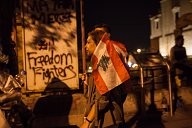
Demonstration in Beirut
Bilal Tarabey / Le Pictorium
LePictorium_0217358.jpg
It has been a week now since the Lebanese are demonstrating. From their basic and spontaneous demands (the abolition of the famous Whatsapp and Viber messaging networks user fee project), the movement has since turned into a revolution. Lebanese of all religions and all faiths are gathered in the heart of the capital, recreate the social link between them. Since the end of the civil war, communities have been de facto separated, politically (each has its political party or parties) and geographically. Beirut is divided into homogeneous community neighborhoods, but these barriers have jumped. Everyone is now every night in the city center. And talk to each other This Thursday night the rain reduced the number of participants, but the city remained occupied by the demonstrators, who demand the abolition of the confessional system in place. Some marginal tensions took place, groups said to be related to the Hezbollah who appeared, without flags, but modifying some slogans to spare their leader the popular (verbal) vindictiveness. The speech of the President of the Republic Michel Aoun earlier in the afternoon, mounted, did not calm the protesters. In essence, it refuses any political and institutional change caused by the street. Many rely on this weekend to gather hundreds of thousands of people again. In parallel, a festival atmosphere is created, with its sellers of juice, tea, and even improvised hookah bars.

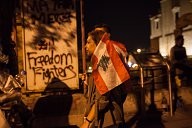 Demonstration in Beirut / Bilal Tarabey
Demonstration in Beirut / Bilal Tarabey